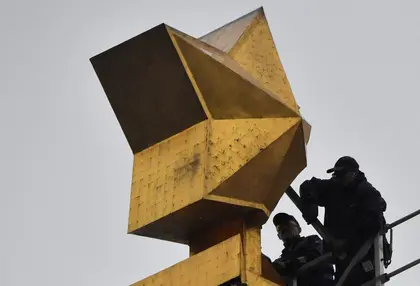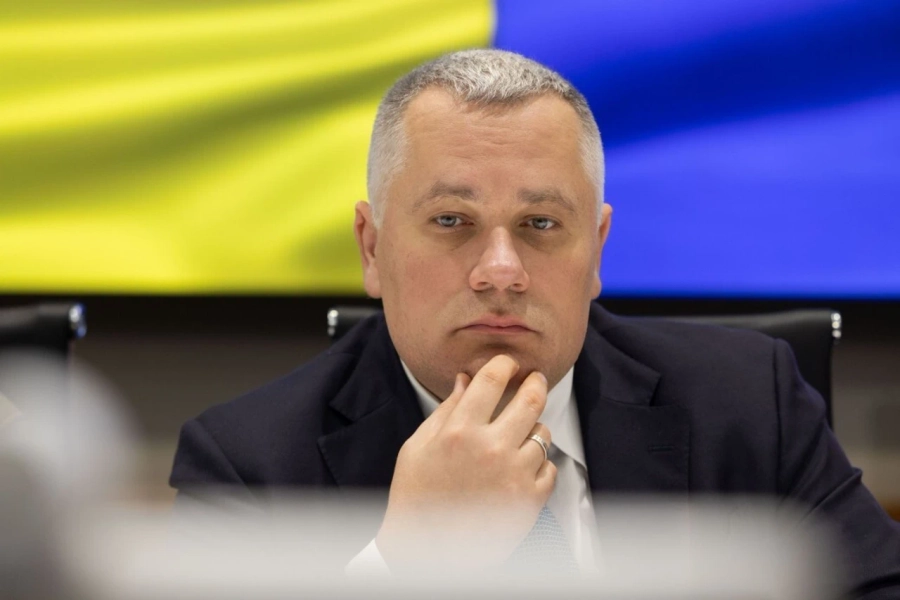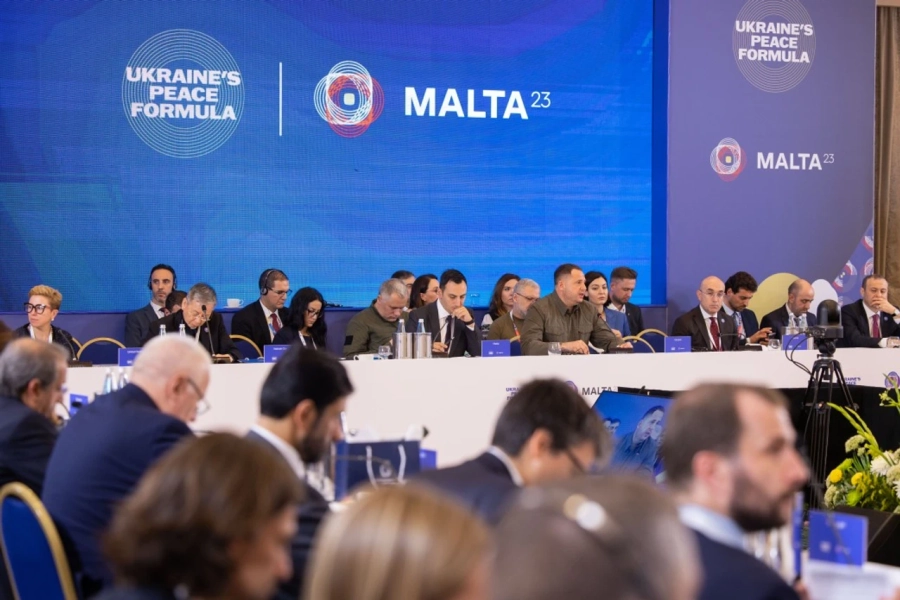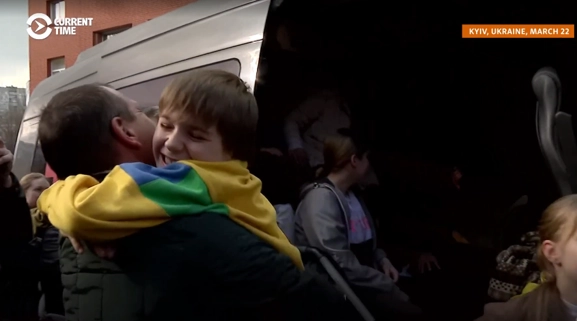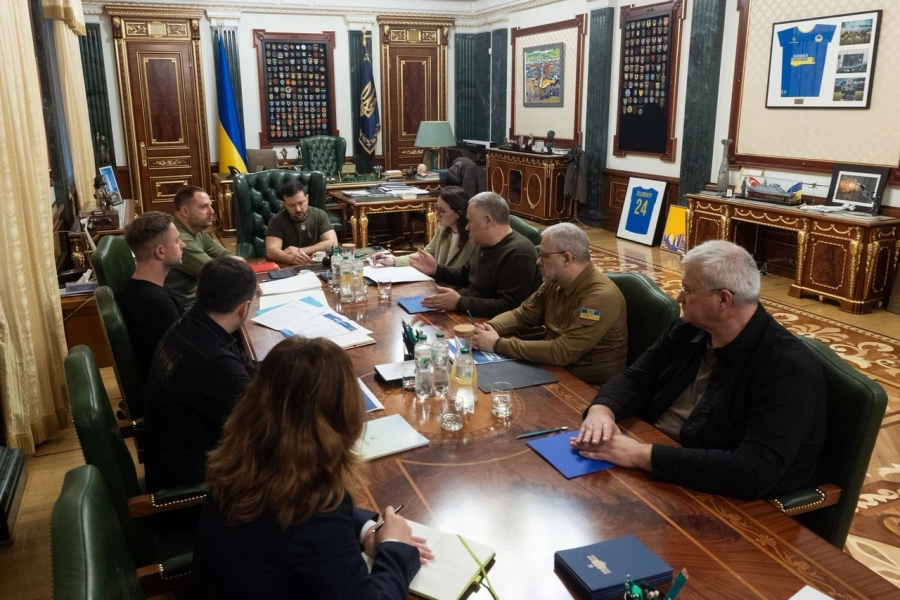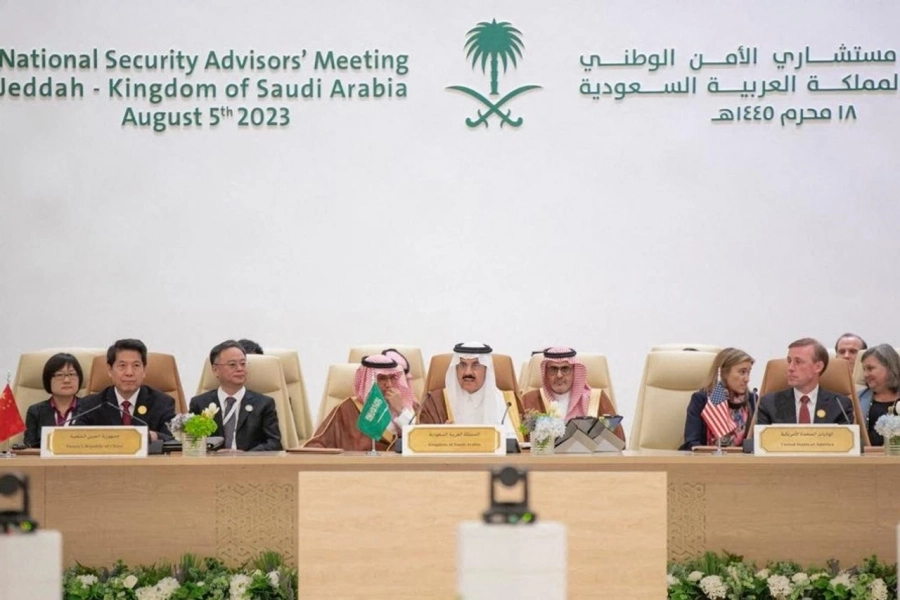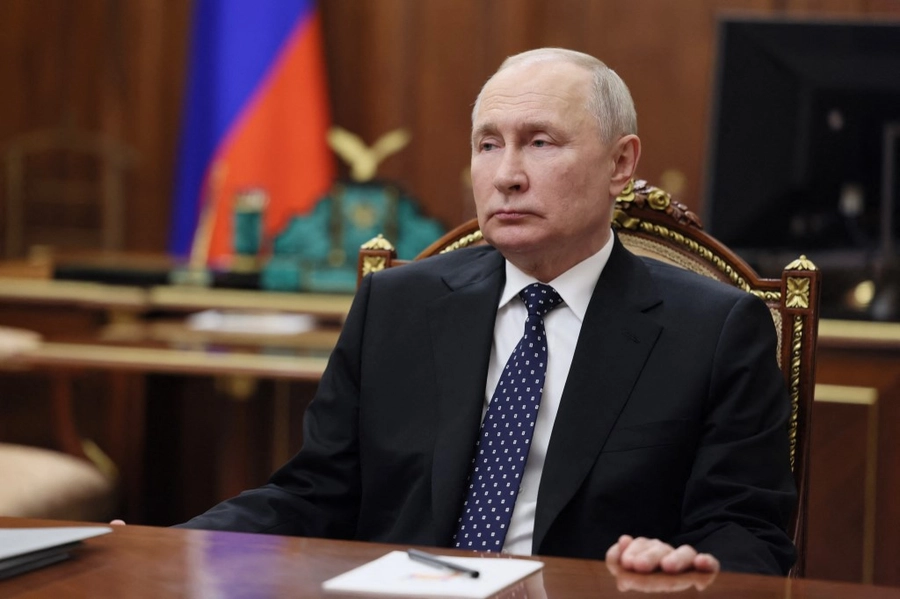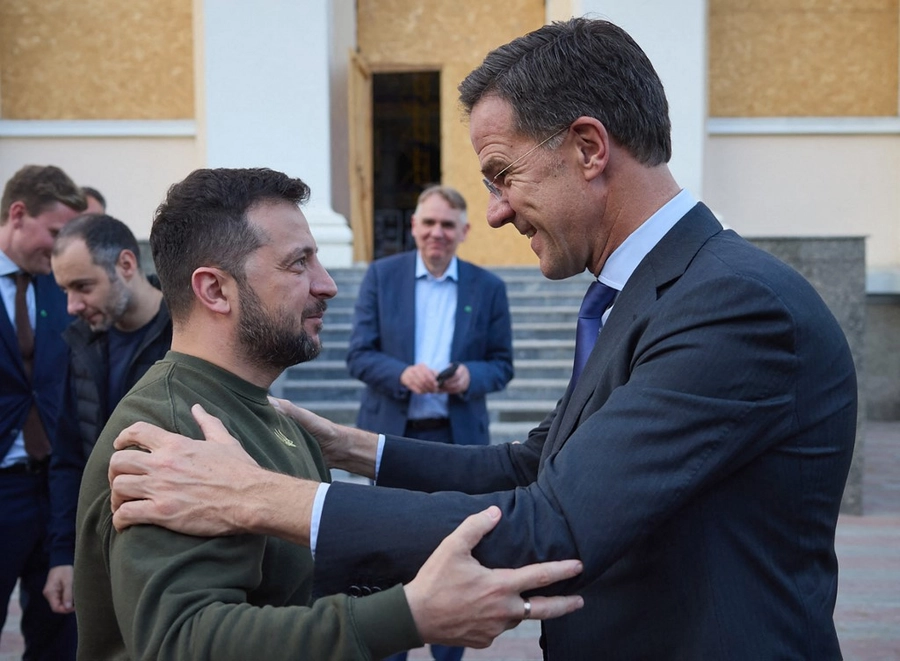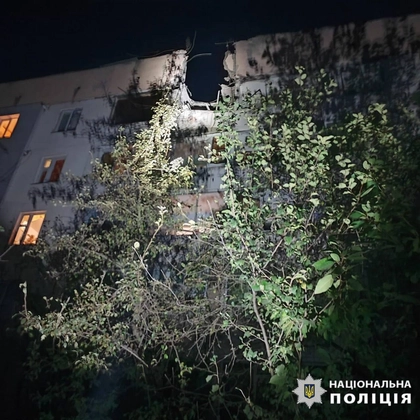Ukraine’s plan to hold a global peace summit that it envisions will help pave a path for a new system of international relations is picking up steam.
In an exclusive interview with Kyiv Post, Ihor Zhovka, the deputy head of the President’s Office, said that Ukraine intends to organize a major global summit within the next few months, one that would include world leaders and which would help create a system to not only end the war in Ukraine but also lead to fewer wars in general.
JOIN US ON TELEGRAM
Follow our coverage of the war on the @Kyivpost_official.
In preparation, Kyiv organized, and Malta hosted the third planning meeting on Oct. 28-29. The first was in June in Denmark and the second in August in Saudi Arabia.
“Many experts suggest that these meetings are actually a space where a new system of international relations is being created,” Zhovka said.
Kyiv sees the current system, where some say the United Nations can be rendered impotent thanks to Russia’s veto power, as insufficient to dealing with problems that arise when a state like Russia is belligerent.
“After all, after the end of the Cold War and the collapse of the Yalta-Potsdam system of international relations, a new system did not emerge. That is why, for more than 30 years after the Cold War, turbulence has continued in various regions of the world,” Zhovka said.
With Ukraine being a prime target of Russian aggression, it sees itself as a nation with the responsibility of helping to build a better system, one where there are fewer wars.

South Korea Demands 'Immediate Withdrawal' of North Korean Troops in Russia
Kyiv envisions its peace formula, first presented by President Volodymyr Zelensky at the Group of 20 summit in November last year, as: “preventing the repetition of aggression against Ukraine and any other state in the future, small or big.”
For that reason, Ukraine is seeking buy-in for a global-level peace formula, not only from the US, the EU, and China, but also from countries throughout the Global South – but excluding Russia.
And Ukraine’s efforts are picking up steam.
National security and foreign policy advisors to the leaders of 66 countries gathered in Malta to discuss Kyiv’s wide-ranging peace plan – which includes ten points, ranging from nuclear safety to prisoner exchanges – as a formula applicable not just for Ukraine, but later, one that could be used for any nation.
China’s foreign minister, Wang Yi, was not present at the last summit in Malta, but this was only because he was in Washington for high-level Simo-US meetings, Zhovka said.
Meanwhile, every third participant at the meeting came from the Global South, and the overall number of participating countries increased by 23 since the second peace formula meeting on Aug. 5-6 in Jeddah, Saudi Arabia.
Coming out of the Malta meeting, Kyiv Post spoke with Zhovka to learn more about what’s coming next.
Deputy Head of the Office of the President Ihor Zhovkva. Photo:president.gov.ua
It is very important for us Ukrainians to receive good news. Let's start with the main achievements of the meeting in Malta.
There were several. Our general impression is that this third meeting was more substantive and meaningful than the previous two.
In Copenhagen, we were just starting the process, in Jeddah it was perhaps more ostentatious because it was Saudi Arabia, an ornate venue. But in Malta, we reached substance. And our partners have said so.
Some of them were skeptical about the very idea of holding the third meeting on those dates. They said: “Let's wait a little longer, there is no content yet...”
After that, they started coming up to me and saying that the work had really started to make sense because the right approach was chosen.
We went through each point and considered the first five. So, the first result is that we were able to speak to the point. Another practical difference from previous meetings is that for the first time, a final document was adopted.
Yes, it was not the final declaration of all the states, but a joint statement by the chairmen. But this document was made public at the end of the meeting, read by the Maltese co-chair.
It contains several important provisions. Firstly, the fact that Ukraine is suffering from Russian aggression.
It is important that this be heard and seen by representatives of the Global South.
The other provision is about the need to begin thorough preparations for the Global Peace Summit – this is the first time it was mentioned in a joint document.
I'm certainly not an expert in international relations with 20 years of experience, but after reading this statement, I got the impression that it was just a brief summary of what happened in Malta, but without any specific conclusions about what exactly was achieved...
We made the decision to hold the Global Peace Summit.
So, we can already talk about it? The joint statement only mentions preparations.
Of course, in terms of a specific date and time, then no, we can't. But what is preparation? We had a meeting in Malta, and we may have to have another one. Because five points were considered, and five more are still in the pipeline.
You see, people don't want to go to a summit just for the sake of meeting. And I'll tell you more, we don't want that either.
We don't need a summit for the sake of a summit, and neither do our partners, particularly from the Global South.
We must come to the summit with prepared documents. Not only do I mean the final joint statement, but also an action plan for each item.
What happened at the Malta summit?
I will start with the first item – nuclear safety. The Minister of Energy Herman Halushchenko, who is a co-leader of this item from Ukraine, started, followed by the representative of France, who is a co-leader.
Then other states participating in this working group made statements, and at the end, the moderator, who in this case was Andriy Yermak (the head of the President’s office), summed up the results.
The second point was food security. Yulia Svyrydenko (First Vice Prime Minister of Ukraine and Minister of Economy) started by presenting the action plan in her presentation.
Participants in the meeting on Zelensky's Peace Formula in Malta. Photo: president.gov.ua
Then Turkey took the floor as a co-leader, then the European Commission representative as a co-leader, then other countries, including those from the Global South.
The fifth point – territorial integrity – elicited the widest response. We could not even give everyone the floor.
Mykola Tochytskyi, a representative of the Ministry of Foreign Affairs, started the discussion, followed by MP Halyna Mykhailyuk, who spoke on behalf of the Verkhovna Rada, as the Ukrainian parliament is also working on this item.
Then all the G-7 countries spoke, even taking the floor themselves. And then other countries followed, and we even finished about an hour-and-a-half later than planned.
The first session on the five items lasted four-and-a-half hours instead of the planned two-and-a-half.
And the second session, with the opportunity for representatives of all countries to speak on all points, lasted three hours instead of the planned two-and-a-half hours.
Did representatives of all 66 countries hear each item simultaneously or did they work in groups?
Simultaneously, one by one, we all considered each item, because everyone wanted to speak out.
By the way, another concrete result was achieved regarding the fourth point – the release of prisoners and the return of civilians, including children.
The Canadian representatives started with an opening statement – it was my agreement that he should start as a co-leader – we have moved away from the idea that Ukraine should be the first to speak.
And the National Security Advisor to the Prime Minister of Canada, Jodi Thomas, proposed to establish an international coalition to free Ukrainian civilians, first and foremost children.
Next, the representative of Qatar, a country in the Global South and Middle East, took the floor and not only supported this initiative, but also addressed specific issues. Unfortunately, I cannot tell the press about this.
Qatar is a country that should be immersed exclusively in what is happening in the Middle East... But the Deputy Secretary of the National Security Council of the Emir of Qatar comes to Malta, supports the Canadian initiative, and then discusses specific things at a bilateral meeting with Andriy Yermak.
We noted that in his interview, Andriy Yermak focused on the return of Ukrainian children abducted by Russia. But how do the efforts in the context of the peace formula differ from those that are already underway? From time to time we read about the return of a few children.
Do you know how many Ukrainian children have been deported to Russia? The official figure is 20,000, and I won't even tell you the unofficial figure... So, those children who have returned represent, unfortunately, a very small number.
Is there a possibility of a mass return in this case?
We are working on this. If this coalition includes not one country, not two, but 10-15, then of course the number should be larger, and it will be larger.
If I tell you, for example, that tomorrow about 1,000 children will be returned, you will put it in the headline and then ask me: “why only 999?” But, you know, honestly, it was worth going to Malta just to create such a coalition.
Ukrainian child being reunited with his father. Screen grab. RFE/RL
In the next few days, you will see some events, including in Kyiv, dedicated to this very issue. As a result of what was started in Malta.
Apart from the return of children, what other concrete results have been achieved? For example, on the issue of territorial integrity, which was emphasized by Andriy Yermak and yourself? What step forward was made in Malta in this regard?
This is not an easy point... In its entirety, it reads “cessation of violations of the UN Charter, restoration of Ukraine's territorial integrity and sovereignty, and creation of a new world order.” And we have covered all three of these components.
What would the reform of the UN and the restoration of the UN Charter entail? It is the restoration of trust in the organization and the enforcement of the requirement that Russia, as an aggressor state, does not block Security Council resolutions.
President Zelensky made relevant proposals in this regard in New York, when he addressed the UN General Assembly and the UN Security Council.
We disclosed these proposals in more detail. And when we did so, representatives of 66 states were present, including, for example, Brazil, which also advocates UN reform (this country is currently presiding over the UN - ed.), as well as Germany and other countries.
Many experts suggest that these meetings are actually a space where a new system of international relations is being created.
After all, after the end of the Cold War and the collapse of the Yalta-Potsdam system of international relations, a new system did not emerge.
That is why, for more than 30 years after the Cold War, turbulence has continued in various regions of the world.
President Zelensky discussing results of the Malta round with Ukraine's delegation. Photo: FACEBOOK
Unfortunately, this also applies to Ukraine: first, we got Russia's aggression, and then Russia's large-scale war against Ukraine.
That is why Ukraine is at the forefront or is at least one of the leaders in creating a new global order.
And at the next meeting, we will go over the next points.
Such as the sixth (withdrawal of Russian troops, cessation of hostilities and restoration of the state border with Russia), seventh (restoration of justice), eighth (environmental safety), ninth (prevention of escalation) and tenth (recording the results of the war).
When I say “step forward,” I do not mean that we will be able to restore territorial integrity tomorrow. I am asking about the progress that has been made in Malta.
We managed to achieve that, all the countries agreed that Russia violates the UN Charter and openly disrespects the organization.
There were representatives from Brazil, India, Saudi Arabia, other countries of the Global South...
Twenty-three new states have joined us, most of them from the Global South. And they came to discuss the process of establishing peace in Eastern Europe.
One might wonder “What does the Global South have to do with Malta?” But a representative of Mexico, a country that is traditionally skeptical of Ukraine, came and took an active part.
Or Kenya, which had not previously participated in the first two meetings, and we did not even have a Kenyan representative (in the working groups - ed.). Thailand participated, as well as representatives from Bahrain, Armenia...
How did you manage to reach an agreement with Armenia?
The Ukrainian side had to work hard to get a high-ranking Armenian representative, the Secretary of the Security Council Armen Grigoryan, to come. I cannot disclose the details of how we worked on this...
Andriy Yermak held a separate bilateral meeting with him, and we talked about important things in that region.
The Ukrainian peace formula can be applied in other regions of the world, its provisions can be universal.
You said that before the third round, Kenya was not even present at the level of working groups. How did its representative prepare for the Malta meeting, and how familiar was he with the content of the work on the Ukrainian peace formula?
I personally sent the entire body of work that we had to the diplomatic adviser to the President of Kenya, Monica Juma, starting with the President's speech at the G-20 summit in Bali, continuing with our first formulations of the reduced 10 points, the results of the first and second summits, and ending with the interim results of the work of the working groups.
Our embassy also worked with the Kenyan Foreign Ministry. It took some time to determine who should be there, and eventually, the Kenyans appointed their representative.
We understood that we would probably not hear any loud statements about Ukraine's territorial integrity from Kenya at this summit. But the Kenyan representative was present online all the time, he was familiar with the statement of the co-chairs.
Why is Kenya important? Apart from the fact that it is a large country on the African continent... We had a great meeting between the President of Ukraine and the President of Kenya in New York. By the way, it was the first. There are UN agencies in Kenya. Kenya is interested in our Grain from Ukraine program.
And I have the feeling that Kenya will be quite actively involved in the implementation of the peace formula in the future.
What happened to China? Can we talk about why the Chinese representative didn’t come to Malta?
Nothing happened with China. The Chinese representative was unable to participate. We received information from the Chinese side that, unfortunately, Li Hui's schedule didn’t allow him to participate in this meeting.
You know that on 26-28 Oct., which is almost the date of the summit, there were high-level Sino-US meetings. Chinese Foreign Minister [Wang Yi] came to Washington, where he met with Joe Biden, as well as his national security adviser, Sullivan.
This was followed by an official statement from the Chinese representative the next day.
So there's no need to look for sensationalism, conspiracy theories or any underhand games here.
Do Chinese representatives continue to engage at the level of working groups?
The Chinese ambassador [Fan Xianrong] took part in the working groups.
In total, we have had nine such meetings, and I think he participated in almost all of them. Soon we will hold the 10th meeting at the ambassadorial level, and we are very much looking forward to China's participation.
But I have no reason to say that China will somehow withdraw from the process.
What about Turkey, the country that has helped us a lot with the grain corridor? Against the backdrop of Erdogan's statements that Israel is a “war criminal” and an “occupier,” and the fact that Ukraine supports Israel, could there be some disagreements or a shift away from working on the peace formula?
Let’s clarify Ukraine's position. Ukraine supports the right of any state, including Israel, to self-defense. This is what we have been saying since the first day [of the Hamas attack on Israel].
But you also saw the president's statement that in no case should civilians be victims of the confrontation.
We have clearly communicated this position, and it was heard in the Arab world.
Therefore, I do not agree with placing Ukraine and Arab countries on different sides of the barricades.
Ukraine knows better than anyone what it means when civilians suffer in wartime. And we are really saying that any military action should be conducted in a civilized manner.
As for Turkey, President Erdogan's National Security Adviser Akif Kilic personally arrived in Malta. Despite the fact that the next day was a big holiday – the 100th anniversary of Turkish independence.
Unfortunately, he had to leave a little earlier, but he attended both panels, acted as a co-speaker on the food security item and held a bilateral meeting with Andriy Yermak.
It was very important to hear Kilic's position on Turkey's willingness to start implementing this item as early as today. But you and I remember that the Global Peace Summit must first take place.
Therefore, there are no contradictions between Ukraine and Turkey due to the events in the Middle East and there cannot be. Turkey is a very important country for us from many points of view, not only in terms of the grain corridor.
By the way, it continues to do everything it can to restore the format of the corridor that existed before Russia withdrew.
In general, did you notice a cooler attitude towards Ukraine on the part of the representatives of the Global South present in Malta against the backdrop of the events in the Middle East?
There were three countries from the Persian Gulf region – none of them signaled anything of the kind.
It's very simple: if they didn't want to come or participate, who would have forced them? They are independent states.
For example, Saudi Arabia is a country that was one of the first to help us with hostages from Azovstal, so how can it turn around and say, “No, listen, there are more important things going on?” The President of Ukraine has an excellent personal relationship with Mohammed bin Salman Al Saud.
Saudi Arabia's National Security advisor and Minister of State Musaad bin Mohammed al-Aiban (Photo by SPA / AFP)
I’m referring to Andriy Yermak's statement that it was not easy to keep the focus on Ukraine. Was there a threat that the meeting would not be held on Oct. 28-29?
Of course. That's what I told you – some of our partners advised us: “Maybe let's postpone it a little bit...” But this is not about a cold snap in relations.
Yes, there was indeed a risk of a postponement, but these are slightly different things – a cold snap and a shift in focus. We have to do everything we can to keep the focus on Ukraine. And we are doing that.
Okay, then I would like to ask you to comment on Mr. Yermak's remarks about what many participants at the Malta meeting asked: “What's next, how does Ukraine see the end of the war, what are our forecasts?” Were there any fears or expectations voiced by representatives of our partners in Malta?
If there were any concerns about specifics before the meeting, most of them were dropped when we saw the results of the five points. And we are ready to show the results of our work in five more working groups.
What's next? Our agenda does not change. We want to hold the inaugural Global Peace Summit without Russia. We have made it clear that there is nothing to talk about with a country that violates all norms – from the UN Charter to civilized forms of warfare – by blocking our ports, polluting the environment, and blackmailing the world with nuclear weapons.
Are we talking about holding the Global Peace Summit by the end of the year?
This is the goal we set. Perhaps we can talk about the end of the year or the beginning of next year.
If it were up to us and the G7 or the EU, we would have already held it. But we need the presence of the Global South. And it is more difficult here, it is true, but we will keep working on it.
Perhaps we will need another meeting at the level of national security advisers and political advisers to look at five more points and then move on to the inaugural Global Peace Summit
It’s important for us to hold it as soon as possible, because the logic is as follows: after the Summit, there will be further events on each of the points, and then point 10 – when we know, together with our partners, what to talk about with the aggressor country, which will already be deprived of the tools of aggression in all areas.
While our Armed Forces are fighting Russia on the battlefield, we must all work together now to counter everything it does in other areas, from food security to ecology.
This is called collective pressure. And we have already seen that Russia is afraid of force – military, political, diplomatic. This must be done. This is what our peace formula is designed to do.
Was the UN General Assembly resolution on the Special Tribunal discussed in Malta?
President Vladimir Putin on Nov. 7, 2023
Not in detail. Firstly, because the Special Tribunal is in the seventh point of the peace formula.
But during bilateral meetings with partners, in particular, with Western partners, it was certainly mentioned. By the way, today I can say that the number of states in the Core Group on the Special Tribunal has increased from 38 to 40. Just recently, two new states have joined.
We talked to our Western partners, the G7 countries, about the fact that Ukraine continues to insist on the approach it has proposed. That is, no internationalized or hybrid formats.
We want a Special Tribunal that will actually prosecute the crime of aggression.
Are there any statistics on bilateral meetings within Malta?
Definitely more than 20. Some meetings were collective. We did not manage to talk to everyone in this format because of schedules and the fact that some of the representatives were online.
Regarding the G7 countries with which bilateral negotiations on security agreements are underway. In our last interview, we focused on France, the fifth G7 country with which this process has been launched. We saw that in Malta, Andriy Yermak discussed this with Italy. Have such talks started with all the G7 countries?
Everyone is connected, in one way or another. We had a good conversation with Italy. There has been no formal start of negotiations yet, but they will take place.
Moreover, we have started such negotiations with another state, the Netherlands. They were the first non-G7 country with whom we started consultations on security guarantees. By the way, we have a very ambitious timetable, we want the relevant bilateral document to be concluded very quickly.
Ukrainian President Zelensky and Dutch Prime Minister Mark Rutte. Handout / UKRAINIAN PRESIDENTIAL PRESS SERVICE / AFP
In Malta, I had a substantive, very structured meeting with Geoffrey van Leeuwen, the Dutch Prime Minister's adviser on foreign policy and defense, on this issue. The Dutch side came up with corresponding proposals.
Thus, this is the sixth country with which such consultations have begun. We have already started such talks with five G-7 countries – the United States, the United Kingdom, Canada, Japan, and France – and are at various stages of negotiations with the other two.
You can also highlight the text and press Ctrl + Enter


